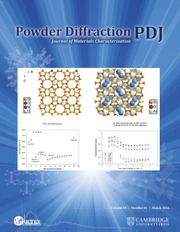Article contents
Effect of Dy-doping on the microstructure and magnetic properties of Y1−xDyxMnO3
Published online by Cambridge University Press: 29 May 2013
Abstract
The effect of Dy3+ doping at A-site in hexagonal YMnO3 on the microstructure and magnetic properties was studied. Polycrystalline Y1−xDyxMnO3 samples with x ranging from 0 to 1 were synthesized by the solid-state reaction method. The microstructures of all the samples were studied by X-ray diffraction, which shows that Y1−xDyxMnO3 with a low concentration (x ≤ 0.5) of Dy3+ retains a hexagonal symmetry. The crystal structure refinements of the hexagonal Y1−xDyxMnO3 using the Rietveld method show that the unit-cell parameters of a, c, and unit-cell volume increase with increasing Dy doping, while the MnO5 trigonal bipyramids remain almost unchanged. The remarkable increasing of magnetic moment at a low temperature with increasing the Dy3+ doping concentration is ascribed to the spin order of Dy3+ and the increasing Dy3+–Mn3+ coupling and Mn3+–O–O–Mn3+ interaction.
Information
- Type
- Technical Articles
- Information
- Copyright
- Copyright © International Centre for Diffraction Data 2013
References
- 2
- Cited by

